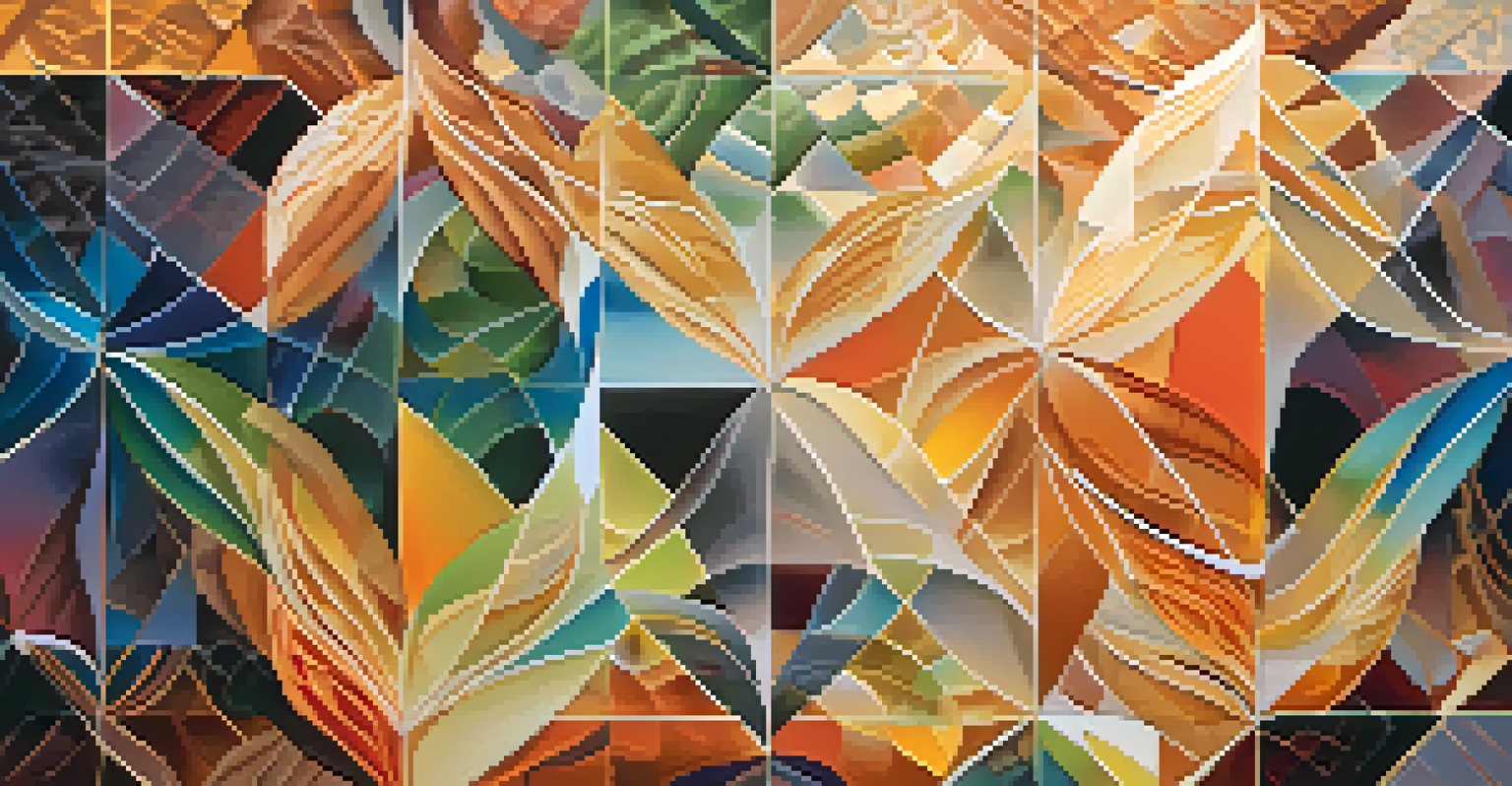Entheogenic States and Their Influence on Non-Duality

Understanding Entheogenic States: A Brief Overview
Entheogenic states refer to altered states of consciousness often induced by substances like psilocybin or ayahuasca. These experiences can lead to profound insights about the self and the universe. Many individuals report feelings of unity, connection, and transcendence during these states, making them a topic of interest in both spiritual and psychological circles.
The greatest discovery of my generation is that a human being can alter his life by altering his attitude.
The term 'entheogen' itself comes from Greek, meaning 'generating the divine within.' This suggests a deep, transformative experience that can alter our perception of reality. By understanding entheogenic states, we open the door to exploring their potential impact on our consciousness and spiritual practices.
As we delve deeper into this topic, it’s essential to consider not just the substances involved, but also the context and mindset surrounding their use. The setting can significantly influence the experience, shaping how individuals perceive themselves and their connection to the world.
What is Non-Duality and Its Significance?
Non-duality is a philosophical concept suggesting that the distinction between self and other is an illusion. It emphasizes the interconnectedness of all beings and the idea that we are part of a larger whole. This perspective can profoundly shift our understanding of existence and our place within it.

Many spiritual traditions, including Buddhism and Advaita Vedanta, explore non-duality as a means to achieve enlightenment. In these teachings, realizing the non-dual nature of reality can lead to liberation from suffering and a deeper sense of peace. It invites us to question the narratives we hold about ourselves and our separateness.
Entheogens Induce Non-Dual Awareness
Entheogenic substances can lead to profound experiences of unity and interconnectedness, often aligning with the philosophical concept of non-duality.
The significance of non-duality lies in its potential to transform our relationships with ourselves and others. By recognizing that we are not separate entities, but rather expressions of the same universal essence, we can cultivate compassion, empathy, and understanding in our interactions.
The Intersection of Entheogens and Non-Duality
Entheogenic substances often induce experiences that resonate with non-dual awareness. Users frequently report a dissolution of the ego, leading to feelings of unity and interconnectedness. This can be a powerful catalyst for personal transformation and spiritual awakening.
We are not human beings having a spiritual experience; we are spiritual beings having a human experience.
During these altered states, individuals may have profound realizations about their identity and the nature of reality. For many, this experience serves as a direct encounter with non-duality, allowing them to grasp concepts that may have previously been abstract or intellectual.
The interplay between entheogenic experiences and non-dual awareness raises important questions about the nature of consciousness. Are these profound insights a glimpse into an inherent truth, or merely a temporary alteration of perception? This mystery continues to inspire exploration and discussion in both scientific and spiritual communities.
Personal Experiences: Anecdotes of Transformation
Many individuals have shared transformative stories about their journeys with entheogens and how these experiences reshaped their understanding of non-duality. For instance, a common narrative involves a sense of merging with nature or the universe, leading to a profound feeling of belonging.
These personal anecdotes highlight the subjective nature of entheogenic experiences. While some find clarity and insight, others may encounter fear or confusion. Regardless, such journeys often prompt deep reflection on one's beliefs and perceptions of reality.
Cultural Significance of Entheogens
Historically, entheogens have played a vital role in various cultures, particularly in spiritual ceremonies, highlighting their deep-rooted importance in human connection and exploration.
These transformative experiences can serve as a reminder of our shared humanity and the potential for growth through understanding our interconnectedness. They encourage us to explore the depths of our consciousness and the impact of our perceptions on our lives.
Scientific Perspectives on Entheogens and Non-Duality
Recent research in neuroscience has begun to investigate the effects of entheogens on brain activity and consciousness. Studies suggest that these substances can alter neural pathways, potentially fostering a sense of unity and non-dual awareness. This scientific perspective offers intriguing insights into the mechanisms behind these transformative experiences.
One study found that psilocybin can decrease activity in the default mode network, the area of the brain associated with self-referential thought. This reduction may lead to the dissolution of the ego, allowing individuals to experience a sense of oneness with the universe. Such findings provide a fascinating bridge between science and spirituality.
While more research is needed to fully understand the relationship between entheogens and non-duality, the initial findings suggest a promising correlation. This intersection of science and spiritual practice continues to inspire curiosity and exploration in both fields.
Cultural and Historical Context of Entheogens
Entheogens have been used across various cultures for centuries, often in religious or spiritual ceremonies. Indigenous groups, in particular, have utilized these substances to connect with the divine and foster community spirit. This historical context highlights the deep-rooted significance of entheogenic experiences in human culture.
For example, the use of peyote in Native American rituals demonstrates the cultural importance of entheogens in seeking non-dual experiences and spiritual enlightenment. These traditions emphasize the importance of context, intention, and community in shaping the experience.
Integrating Insights Is Crucial
After experiencing altered states, individuals must engage in practices like journaling and meditation to effectively integrate their insights into everyday life.
Understanding the cultural significance of entheogens can enrich our appreciation for their potential. It reminds us that these substances are not merely tools for personal exploration but are also part of a larger tapestry of human spiritual practice and understanding.
Integrating Insights from Entheogenic Experiences
After experiencing altered states through entheogens, many individuals seek ways to integrate their insights into daily life. This process is essential for translating profound realizations into meaningful change and growth. Without integration, the insights may fade, leaving individuals longing for the clarity they once felt.
Practices like journaling, meditation, and community sharing can facilitate the integration process. These activities help individuals reflect on their experiences and embed the wisdom gained into their lives. The goal is to cultivate a deeper understanding of oneself and one’s place in the world.

Ultimately, integrating insights from entheogenic experiences can lead to lasting transformation and a greater sense of connection to oneself and others. This journey of integration is as important as the experience itself, allowing individuals to embody the non-dual awareness they encountered.